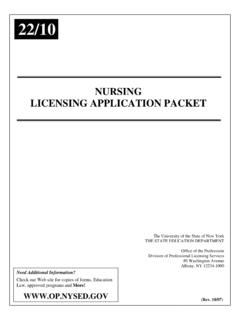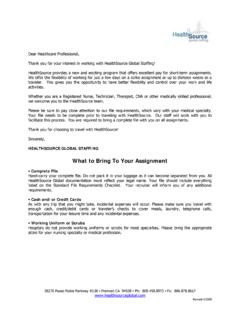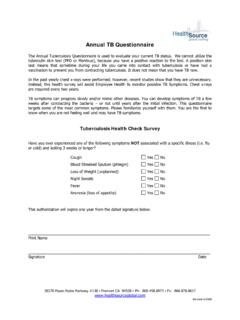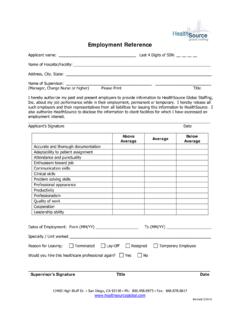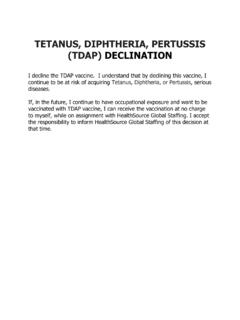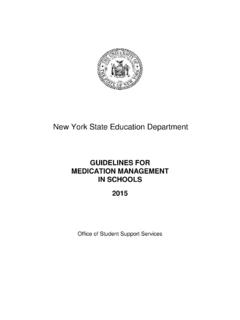Transcription of This test is required of all medical professionals who ...
1 This test is required of all medical professionals who wish to be submitted to client facilities. You need to score 80% or better to pass the test. Question #1 The "7 Rights" of medication administration include? A - Right patient time, drug B - Right dose, route, documentation C - Right to Refuse D - All of the Above Question #2 A patient taking Dilantin (phenytoin) for a seizure disorder is experiencing breakthrough seizures. A blood sample is taken to determine the serum drug level. Which of the following would indicate a sub-therapeutic level? A - 15 mcg/ml B - 4 mcg/ml C - 10 mcg/dl D - 5 mcd/dl Question #3 A patient arrives at the emergency department complaining of back pain.
2 He reports taking at least 3 acetaminophen tablets every three hours for the past week without relief. Which of the following symptoms suggests acetaminophen toxicity? A - Renal damage B - Duodenal ulcer C - Hypertension D - Hepatic Damage Question #4 The maximum recommended daily dosage (healthy adults) of acetaminophen is: A - 3000 mg B - 2500 mg C - 4000 mg D - 6000 mg Question #5 Ibuprofen should be avoided in patients with severe hepatic disease. A - True B - False Question #6 The maximum recommended daily dosage(healthy adults) of ibuprofen is: A - 2300 mg B - 3200 mg C - 1200 mg D - 4000 mg Question #7 A nurse is counseling patients at a health clinic on the importance of immunizations.
3 Which of the following information is the most accurate regarding immunizations? A - All infectious diseases can be prevented with proper immunization. B - Immunizations always provide natural immunity from disease. C - Immunizations are risk-free and should be universally administered. D - Immunization provides acquired immunity from some specific diseases. Question #8 A nurse is performing routine assessment of an IV site in a patient receiving both IV fluids and medications through the line. Which of the following would indicate the need for discontinuation of the IV line as the next nursing action? A - The patient complains of pain on movement. B - The area proximal to the insertion site is reddened, warm, and painful.
4 C - The IV solution is infusing too slowly, particularly when the limb is elevated. D - A hematoma is visible in the area of the IV insertion site. Question #9 A hospitalized patient is receiving packed red blood cells (PRBCs) for treatment of severe anemia. Which of the following is the most accurate statement? A - Transfusion reaction is most likely immediately after the infusion is complete. B - PRBCs are best infused slowly through a 20g. IV catheter. C - PRBCs should be flushed with a 5% dextrose solution D - A nurse should remain in the room during the first 15 minutes of infusion. Question #10 You have an order for a medication you are unfamiliar with. Prior to administration you should: A - Familiarize yourself with the medication using available resources including the drug reference books, staff pharmacist, etc.
5 B - Ask your colleague for information regarding the medication. C - Do nothing you don t have time to look up the medication. D - None of the above Question #11 A physician orders 1500mg of liquid ibuprofen for a patient. You have available 500mg in 1cc, how much will you administer? A - cc B - 2 cc C - 3 cc D - cc Question #12 Your patient is taking Digoxin. All of the following are side effects of toxicity except: A - Bradycardia and other arrhythmias B - Visual Disturbances C - Tremors D - Abdominal pain, anorexia, nausea, and vomiting Question #13 Which of the following drugs should not be crushed: A - Cardizem (diltiazem) tablet B - Oxycontin (oxycodone) tablet C - Prilosec (omeprazole) D - All of the above Question #14 Your patient requests pain medication.
6 Documentation will include: A - Pain assessment before and 30 minutes after administration B - Patients response to medication C - Date, time, drug, dose, route D - All of the above Question #15 The primary danger of giving an IM injection in the wrong area of the buttock is: A - Poor medication absorption B - Abscess formation secondary to fecal contamination C - Damage to the sciatic nerve D - Damage to the underlying bony tissue Question #16 Dr. B. orders a liter of D5LR to infuse over 8 hours. The drop factor is 15 gtts/cc. What is the drip rate per minute? A - 33 gtts/min B - 24 gtts/min C - 31 gtts/min D - 28 gtts/min Question #17 Dr. Smith writes an order for Penicillin G million units IM daily.
7 Available dose is: Penicillin G 9 million units/1 ml. How many milliliters will you give? A - ml B - ml C - ml D - ml Question #18 Which of the following pain scales is most commonly used for patients 9 years of age and older? A - Wong Baker pain scale B - Numeric pain scale C - FLACC (face, legs, activity, cry, consolability) scale D - CRIES (crying, oxygenation, vital signs, facial expression, sleeplessness) scale Question #19 A diabetic patient has a blood glucose level of 22 mg/dl, confirmed by lab draw. You would: A - Give orange juice and report to the next shift. B - Give insulin as ordered and tell the patient to call if they feel worse. C - Provide glucose source and carbohydrates, call MD, continue to monitor blood glucose levels and await further orders.
8 D - Call the patients family and ask them to bring candy during the next visiting hours. Question #20 Mr. Jones is newly diagnosed with hypertension. His doctor started him on Atenolol 50mg by mouth daily. Prior to administration of this medication, the nurse should: A - Have Mr. Jones drink more fluids. B - Check Mr. Jones' blood pressure and hold the medication if blood pressure is below prescribed parameters. C - Assure Mr. Jones his hypertension will resolve with proper exercise. D - Order a Dietary consult to educate Mr. Jones about his dietary needs. Question #21 You have a patient who weighs 75 lbs. How many kilograms does this patient weigh? A - kg B - kg C - kg D - kg Question #22 A newly diagnosed 8 year old child with type 1 diabetes mellitus and his mother are receiving diabetes education prior to discharge.
9 The physician has prescribed Glucagon for emergency use. The mother asks the purpose of this medication. Which of the following statements by the nurse is correct? A - Glucagon enhances the effect of insulin in case the blood sugar remains high one hour after injection. B - Glucagon treats hypoglycemia resulting from insulin overdose C - Glucagon treats lipoatrophy from insulin injection D - Glucagon prolongs the effect of insulin, allowing fewer injections. Question #23 Mr. Smith has recently been prescribed nitroglycerin for treatment of angina. He calls the nurse complaining of frequent headaches. Which of the following responses to the patient is correct? A - Stop taking the nitroglycerin and see if the headache improves.
10 B - Go to the emergency department to be checked because nitroglycerin can cause bleeding in the brain. C - Headaches are a frequent side effect of nitroglycerin because it causes vasodilatation. D - The headaches are unlikely to be related to the nitroglycerin, so you should see you doctor for further investigation. Question #24 A mental health patient is taking Haldol (haloperidol) for treatment of schizophrenia. The patient reports abnormal movements of her face and tongue. The nurse concludes that the patient is experiencing which of the following symptoms: A - Co-morbid depression B - Psychotic hallucinations C - Negative symptoms of schizophrenia D - Tardive dyskinesia Question #25 A patient has been diagnosed with acute gastritis.
